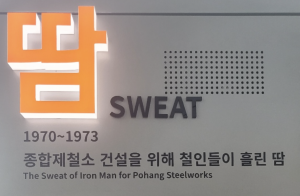Pohang: POSCO Museum
Photo essay of wall text of POSCO Museum of Pohang

Photo essay of wall text of POSCO Museum of Pohang

我訪問到的阿嬤也有在高度人力密集的產業中工作過,如餐飲、紡織等等,反映了當代大環境中原民來到都市的處境。都市原民作為台灣產業發展的推手之一,卻無法擁有安身立命的家,而被迫在各處流浪,直到近代才開啟了與政府溝通的橋樑,卻依然有種種難題需要克服。
Perhaps this eating habit is not a special case. You can ask different families if they have similarities or differences.
This week's class was planned by Molly, who used shells to make decorations with the elders. The finished product is a bit like a wind chime.
這次主要聊的是阿嬤們的遷移旅程,我們主要訪問到的是一對姊妹,年齡相差兩歲,在小學的時候因為有仲介介紹,一同來到台北工作。
以下是他們的遷移過程:
台東-花蓮-台北(有仲介介紹台北的工作,但很多人受騙被賣到妓院)-桃園-台北-新竹
小學因經濟因素離開台東,搭巴士到花蓮,再搭火車到台北(大概民國57年)
This week's communication was very diverse. Originally, we were supposed to scan photos, but our group of grandmas forgot to bring them, so we spent the entire conversation.
The sky was gray, and I felt a bit nervous.
This week, the groups were regrouped, the interviewees were slightly different, and two more lively grandmas were added.
We spent this week's class with the older generation of Cultural Health Station. As soon as we entered the classroom, we danced and exercised with the elderly.
這週的課,我們是和老一輩文化衛生站一起度過的。一進教室,我們就和老人一起跳舞、鍛煉身體。之後,我們按照小組名單與我們的部落家庭會面。今天,我們主要會見了家裡開雜貨店的溫奶奶。在開始與部落居民互動之前,Scott 分享了他之前與土著朋友錄製的幾段傳統音樂錄音,並提醒我們與部落成員聊聊音樂相關的內容。